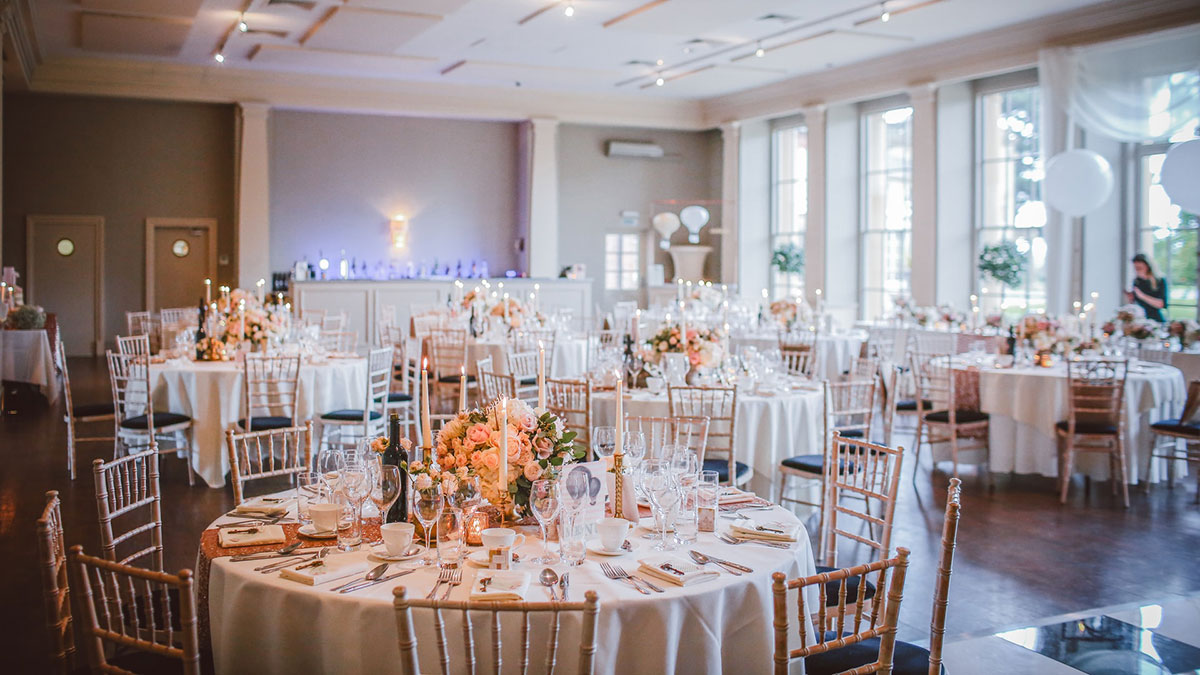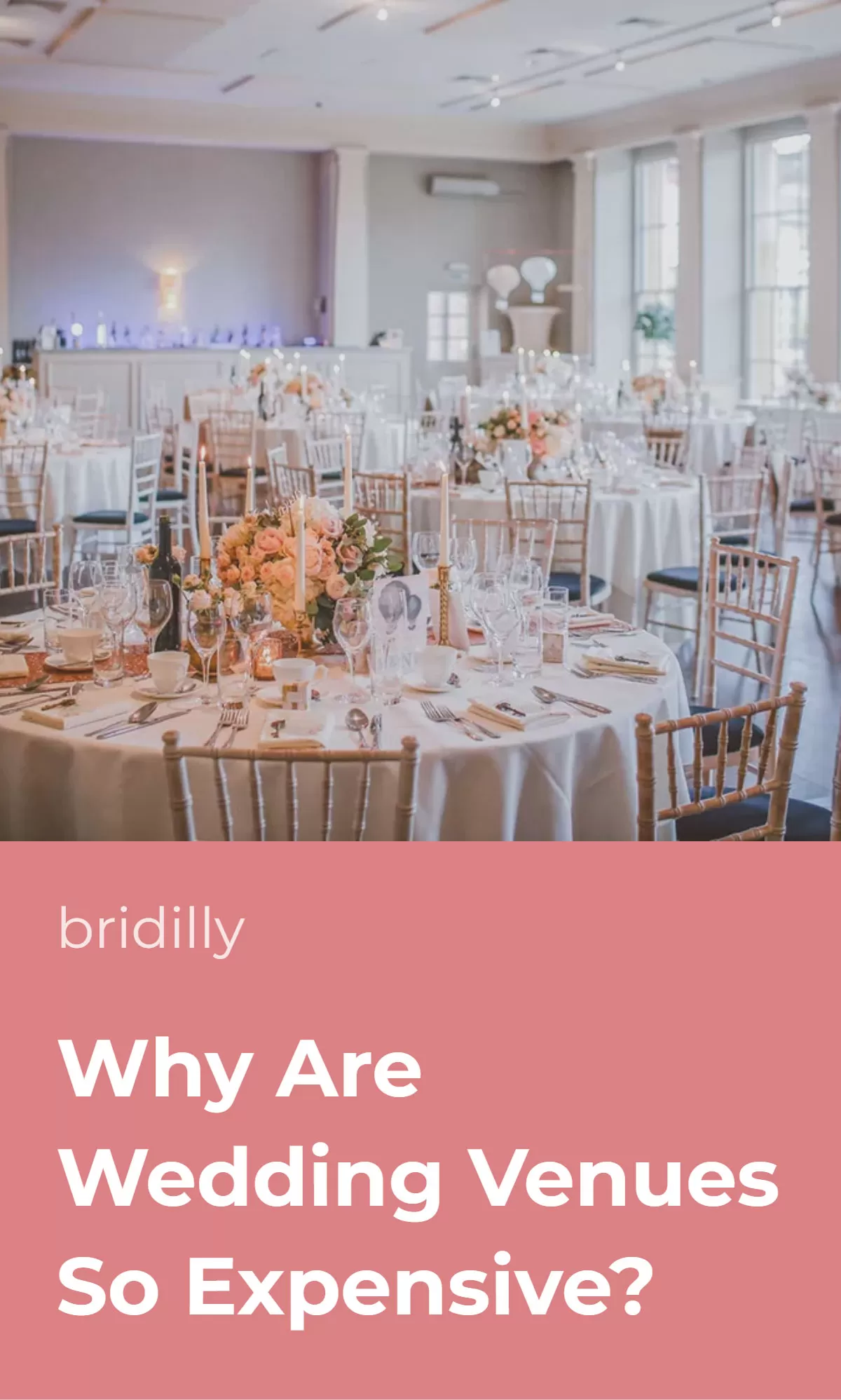Let me guess – you’ve discovered how expensive a wedding venue is and now wish to know why.
It is no secret that weddings are not cheap. But wedding venues are so immensely costly that many brides start to doubt whether they need to rent one. Would a backyard party be a better idea?
It’s crucial to understand that wedding venues charge you not only for the basic utility expenses. In addition, the venue’s location and visual appeal have great importance.
And then, there’s a lot of labor, time, and resources involved in planning, preparation, cleaning, and the event itself.
The average venue price for a wedding generally exceeds $13,000, while the average cost of the whole event tops $20,300.
When you know what you’re paying for exactly, the price of a venue doesn’t seem that high anymore. It also helps to determine which expenses you can avoid and which are essential.
Table of Contents [show]
Basic Costs
Like every business, wedding venues must cover the basic operational costs and charge overhead to get profit.
The venue must regularly pay for electricity, heating or colling, rent, water, building maintenance, property insurance, necessary permits, and that’s only a tiny portion of the operational essentials.
Now, you may think that the cost of a single day’s rent will be calculated strictly by dividing the monthly fee sum by 30.
However, not all venues are rented out non-stop. Typically, they charge more than a single day of operating costs. This way, the venue ensures the total monthly debit is covered even if the venue isn’t rented on all the calendar days.
There’s no way to avoid paying for basic costs. After all, everyone works to earn money. The vendors aren’t there solely to cheer the couple up on their wedding day, even if they are sincerely happy for them.
Location
Location plays a significant role in the wedding venue price. Imagine renting an apartment. Those located in the city center or a fancy neighborhood will inevitably cost more than those located 20 miles outside of the city.
The same goes for wedding venues. Sometimes, the location affects the price even more than the property’s interior or size.
Wedding venues easily accessible for all guests are a great option as you don’t have to worry about transportation. But venues located in the city center or close to your marriage registry office typically cost more.
Some outdoor wedding venues in rural areas present breathtakingly beautiful landscapes and are more affordable. But in this case, the added vehicle costs may counteract your savings.
Furthermore, some exclusive remote wedding venues have a heftier price tag than those located in the city. These include castles, mansions, golf resorts, and some beach venues.
Size
Large weddings require large venues. But even weddings considered small involve dozens of guests who need a place to eat, dance, and walk around. So, naturally, the size of a venue affects its total cost.
The minimum recommended wedding venue size for 80 guests is about 1,000 square feet, for 200 guests 2,500 feet. A point worth mentioning is that strangely shaped spaces must be entirely usable.
This estimation doesn’t include an optional elevated head table, a stage for a music band, space dedicated to the wedding cake, bar, buffet, or gift table.
For any of these options, expect to add another couple of hundred square feet to your invoice.
While going for a larger venue is safer, it’s also more expensive. In addition, a lot of unused space may also make the venue look empty, and the wedding seem boring. That’s why calculating the exact venue size you need is crucial.
Decoration
It’s all about decoration. Even a cheap wedding venue can look stunning with elegant décor. Usually, preparation for a wedding takes a lot more time, labor, and resources than any other event.
As a wedding is a once-in-a-lifetime occurrence, the venue owners understand that putting a few flowers in a vase and sweeping the floor won’t do.
There is more to wedding venue decoration than you might notice, especially in just-married excitement. Some minor interior elements take way more money and time than they draw attention.
However, they help to create the necessary atmosphere, even if they aren’t the focus. Each detail must fit the overall wedding style, and a designer’s hand is of great help here.
Fresh flowers used for centerpieces are costly, must be purchased right before the event, and handled gently. Likewise, hanging paper lanterns, ceiling drapes, and fairy lights are hazardous and cumbersome.
Sometimes, the venue can rent out decorations, but typically, you must purchase them and deliver them to the venue yourself.
Some brides wish to stand out and go for unusual wedding venue decorations such as attractions, waterslides, art murals. All these elements are fun, and guests will remember them, but they also raise the event’s price.
Many brides go for DIY wedding venue decorations. It’s a great way to save money, but you must consider the time and stress that goes into that. The bride, her family, and friends have plenty of more important things to do before the event.
Labor
A lot of labor is involved in all aspects of holding a wedding party. Basic operations, customer service, decoration, food preparation, cleaning the venue, additional services – weddings often require dozens of people to work for a single day.
All these people must get paid for their efforts in making the bride feel like a princess.
Some labor can’t be seen with a bare eye, but it’s just as important as the work of waiters running around the venue.
Delivery of decorations and food, audio system set up, and safety checks happen before the wedding and remain unnoticed by guests and the bride. Then, there’s usually a deejay, photographer, and some show.
As preparation of the venue for the wedding starts long before the special day, venues typically aren’t rented out for days beforehand. So the couple must cover all these days of hard work.
Discussions & Viewings
Checking the venue in person before the wedding day is essential. It ensures the venue has the right atmosphere, is spacious enough, and fits the wedding style. That’s why many couples view different venues until they book one.
Each viewing takes the venue owner’s time and the couple’s money. For the venue, a viewing means blocking a day to ensure the couple can view the property without distractions.
Although the couple are potential customers, the venue is losing a whole day of profit. Plus, the venue manager must drive to the venue and put effort into customer service. In the end, someone has to cover all these expenses.
After selection, the venue still requires additional viewings to measure everything and ensure the decoration is done right. Unfortunately, these viewings aren’t free either.
Apart from in-person viewings, there’s also constant liaison by e-mail or phone. Although you don’t take the venue physically, discussions take time of venue managers that they could spend on other customers. Any time spent must be factored into money.
Cleaning the Venue
The wedding may be over for the couple but not for venue workers. They must clean everything, and in the case of a marriage, this refers to more than washing dishes.
Large parties often end with liquids spilled all over the floor, minor or major property damages, and other mess. The venue workers spend hours cleaning the floor, tables, outdoors, and restrooms.
All wedding decorations must be taken down, which often takes as much time as putting them up.
Stage, audio system, and other add-ons must also be disassembled. After the event, the couple drifts away happily and doesn’t want to spend time cleaning, so this expense is fully justified.
Additional Services
Some venues only include the property rent in the flat fee. Other facilities must be either rented from a third-party company or come for an additional fee.
Therefore, it’s essential to determine whether the chairs, tables, and dishes are included in the wedding venue price in advance.
Then, there are also services such as catering, bar, decoration, and music. Again, some venues provide these services for an extra fee. Others require you to find professionals on your own. Either way, entertainment and food typically come at an additional charge.
Insurance & Safety Measures
Weddings inevitably lead to some property wear and tear. Some damages are minor such as broken glass, and others are major such as a broken window.
There’s also a risk of fire or medical incidents. An insurance and cost of minor wear and tear coverage are included in the renting fee.
Insurance isn’t only necessary for the venue. It also protects the guests and couple if someone gets hurt.
Emotions
A wedding is a special day, and venue managers strive to make the whole process of viewing, discussing decorations, and the event day magical.
Customer experience plays a significant role at each step of the interaction. Preparation for the wedding is often as emotional as the wedding itself, and excellent customer service helps to make each moment memorable.
But excellent customer service is expensive. The effort, time, and optional extras such as champagne on viewings must be covered.
Plus, some venue managers exploit the bride’s emotional vulnerability pressuring her to spend more. Make a local venue price research beforehand and stay within your wedding budget.
This day is meaningful, but your family life only begins. Starting it with debt isn’t wise.


















No Comments Add one
Leave a Comment